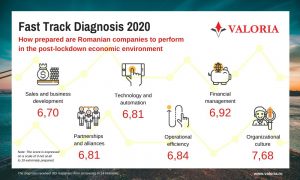Valoria survey: Romanian companies are not prepared for the post-lockdown economic environment

- The overall score that indicates the level of preparation of companies to be able to perform in the post-lockdown business context is 6.96.
- This result shows that there is a significant potential for implementing, standardizing and improving companies’ processes for better results.
Romanian companies need to reposition themselves to find answers to the business challenges posed by the pandemic. However, at this time, most are not prepared to perform in the post-lockdown economic environment. The most deficient area is the sales and business development area with a score of 6.70.
The study launched by Valoria is based on Fast Track, a diagnosis of the level of preparation of companies that takes into account six relevant areas: sales and business development, partnerships and alliances, technology and automation, operational efficiency, financial management and organizational culture. The second part of the diagnosis uses the DMAIC model – define, measure, analyze, implement, control – from Six Sigma to assess the company’s ability to continuously improve its business processes.
For the evaluation of the analysis areas, in the Fast Track diagnosis a scale of the preparation level is used from zero-not at all to ten-very good, and the cumulated results of the 389 completed diagnoses show as follows:
Sales and business development – Overall score 6.70 (average level)
The biggest problem identified is the fact that companies often do not have a CRM system that allows the traceability of sales and business development processes (score 5.59). Also, the cumulative results show that in most companies the stages of the purchasing process that each buyer / customer goes through are not documented (score 6.54). The area where companies say they are best placed is the orientation towards consumers and their needs (score 7.96).
Partnerships and alliances – Overall score 6.81 (average level)
The report made by Valoria shows that the main problem is given by the fact that most companies do not have a process of proactive identification of the most appropriate partnerships and business alliances to support growth in the next period (score 6.11). The aspect in which the responding companies are best at this indicator is the awareness that for the company and the field of activity in which it develops the development of partnerships and alliances is essential to have growth in the next period (score 7.80).
Technology and automation – Overall score 6.81 (average level)
Somewhat surprisingly, the lowest score is received by companies because they do not use new technologies, such as Artificial Intelligence, Big Data or Robotic Process Automation (score 4.40). On the other hand, many companies said that they have opportunities to automate their business processes identified, evaluated and implemented (score 7.74), which is very gratifying.
 Operational efficiency – Overall score 6.84 (average level)
Operational efficiency – Overall score 6.84 (average level)
The main problem reported in terms of operational efficiency is that the responding companies do not have available in time and in a relevant way the information necessary for all staff levels to reach the expected productivity (score 6.76). On the other hand, most companies say that they have the ability to scale the operational processes that produce the best results (score 7.15).
Financial management – Overall score 6.92 (average level)
Most companies say that the main difficulty comes from the fact that they do not have the necessary technology for a financial management to provide the necessary data for operational and strategic business decisions (score 6.59). As a result, they cannot make financial forecasts quickly and accurately, nor can they agilely implement the decided solutions (score 6.91). The strong point indicated by the responding companies here is given by the fact that they have sufficient internal and external capacity to manage accounting transactions and minimize disruptions (score 7.46).
Organizational culture – Overall score 7.68 (good level)
The strengths of the responding companies are given by the fact that the organization has the ability to analyze and learn from experience (score 8.26) and that it has an open culture, without guilt and collaboration (score 8.09). Good scores also appear in the following two elements: employees have autonomy, understand the company’s mission, act with confidence and are involved (score 7.74) and the company has an organizational culture that emphasizes agility and responds well to change (score 7.72 ).
Continuous improvement ability – Overall score 7.11 (good level)
From the point of view of the DMAIC model, companies are best prepared to identify and define the problems that hinder their superior performance, followed by the ability to analyze the factors that need to be corrected or eliminated in order to achieve the desired superior performance.
The most deficient is the ability of the responding companies to maintain the benefits obtained by controlling the result, followed by the ability to correctly and relevantly measure the difference between current and superior performance required.
About the survey
The study is based on the Fast Track diagnosis, which was taken online by 389 managers and entrepreneurs from companies operating in 14 industries between 15 June and 31 August 2020. Of the respondents, 17% come from companies with a turnover of more than 100 EUR million, 7% of companies with a turnover of between EUR 50-100 million, 21% with a turnover of between EUR 10-50 million, 8% with a turnover of between EUR 2-10 million and 47% under EUR 2 million of EUR turnover. No less than 42% of respondents have the position of CEO/President/General Manager.
















